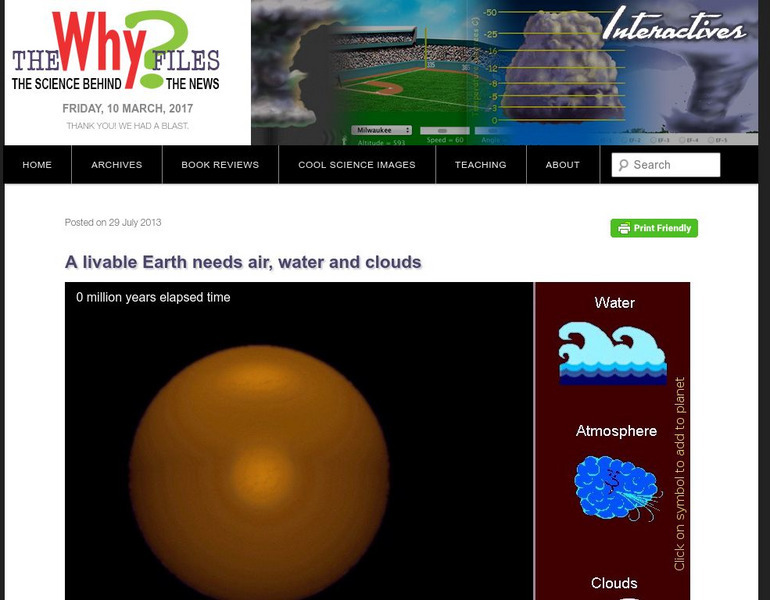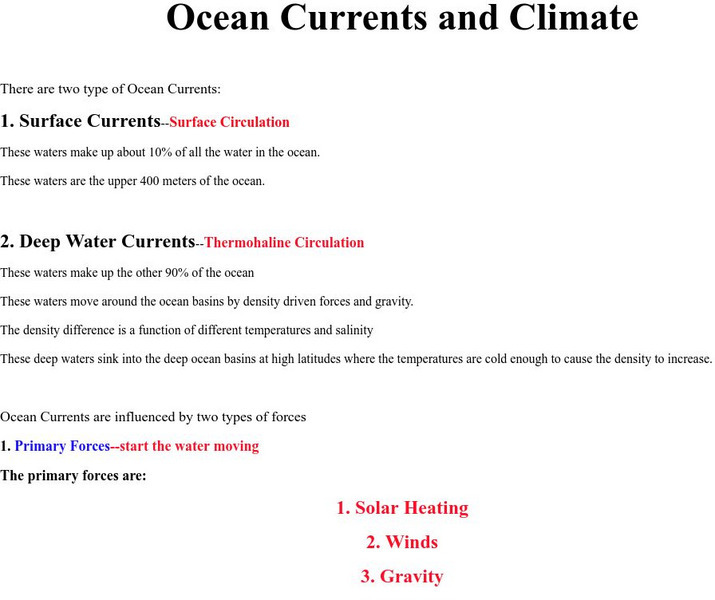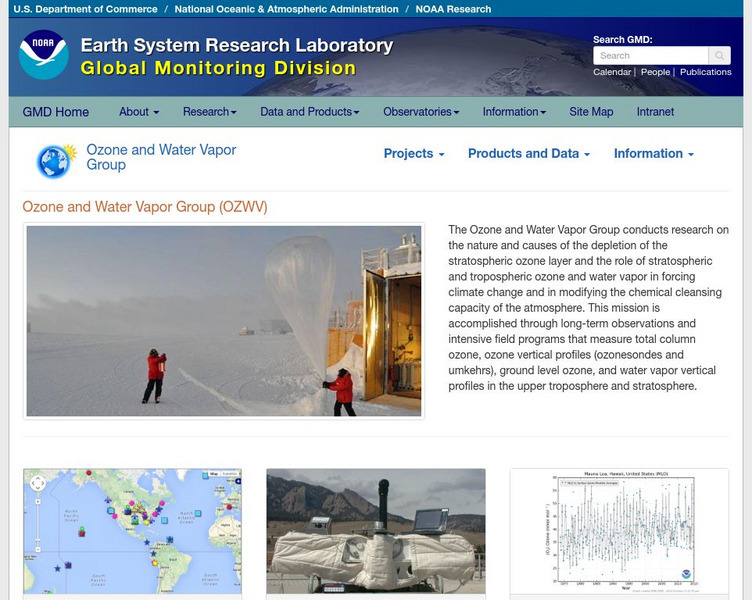Curated OER
Dimming the Sun
Students collect, interpret and analyze weather variable data. They describe atmospheric variables that affect evaporation. Students create graphs and analyze the information collected.
Curated OER
Current Interactions
Students design an experiment to see how wind, temperature, and salinity work together to influence ocean currents and present it in a report format. They explain to their classmates how experiment findings relate to ocean currents.
Curated OER
How Does Your Garden Grow?
Learners create a design for a school garden. In this garden design instructional activity, students analyze what plants grow best in their school's climate and work in teams to design a garden. Learners measure the existing space,...
Curated OER
A Message in a Bottle
Students investigate the motion of water currents by mapping the possible movement of messages cast into the ocean in bottles.They accurately plot the appearance of bottles on a world map and illustrate the flow of an ocean current...
Curated OER
The Big Crush
Students examine weather maps from their state from the past few days. They examine the Highs and Lows on the maps to determine what kind of weather they produce. They use that information to better prepare for their activities and what...
Curated OER
Air Pollution Over Where?
Young scholars predict the movement of an air borne pollutant using their understanding of air currents. They determine which governments and/or communities should be contacted to be forewarned. They also explore the properties of their...
Curated OER
What does AG have to do with me?
Young scholars practice alphabetizing while categorizing sources of basic agricultural products. They discuss agricultrual products, discover where they are grown and draw a simple agricultural scene on poster board.
Curated OER
Deforestation
Students identify the different tropical rainforests in the world using a map. In this ecology lesson, students describe the different methods of deforestation. They create a memo and present it to class.
Curated OER
Introducing The Gulf Stream
Sixth graders research the average temperatures of different places on Earth. In this earth science lesson, 6th graders explain how the sun's heat cause ocean movement. They discuss how temperature change affects the weather we experience.
Curated OER
Three Clouds Activity
Students understand how clouds are formed. In this cloud lesson, students participate in three experiments to make clouds. Students complete activity sheets for each experiment.
Curated OER
Ride the Rock Cycle
Students identify the steps in the rock cycle. They complete a K-W-L chart before the lesson begins. They answer questions about the stages to complete the lesson.
Curated OER
Three Clouds Activity
Students explore how clouds are produced through three different age-appropriate hands-on experiments.
Curated OER
Does Humidity Affect Cloud Formation?
Students use NASA's S'COOL database to identify factors that affect cloud formation.
Curated OER
A Day in the Life of a San Francisco Native Animal
Students write from an animal's perspective. In this writing lesson students explore the landscape of San Francisco prior to the arrival of the explorers. Students research animals indigenous to the area.
Curated OER
Introduction to Earth Sun Relationships Incorporating P.E.
Third graders investigate space science by performing physical activities. In this solar system lesson, 3rd graders perform a relay activitiy with their class in which they race between different "planets". Students define...
Curated OER
Ride the Rock Cycle
Learners examine the steps of the rock cycle. They describe what happens to the rocks in each of the stages. They participate in a rock cycle game to help them with the steps.
Curated OER
Fallout!
Students plot the locations of fallout from two disasters that polluted much of the world's air. They plot the ash fallout from the 1980 Mt. St. Helen's eruption to see what the wind patterns in the United States look like overall. Next...
University of Wisconsin
The Why Files: A Livable Earth Needs Air, Water, and Clouds
Make Earth's climate livable by adding the right amount of air, water, and clouds to its surface and atmosphere.
Other
Earth Science: Earth's Surface and Heat [Pdf]
This textbook chapter looks at the role of temperature in sustaining life on Earth and on weather and climate. It discusses the Earth's movements and the seasons, the circulation of the oceans, wind and weather, and the water cycle....
Scholastic
Scholastic: Study Jams! Science: Weather and Climate: Tides
Is it time for high tide? Make studying the tides fun with this video. Understand the impact of gravity on the water surfaces of the earth. Take the test to see how well the information is understood.
University of Southern California
University of Southern California: Ocean Currents and Climate
The climate of our planet is greatly affected by Earth's oceans. Learn here about the different oceanic currents and the role those currents play on climate.
National Geographic
National Geographic: Sources, Sinks, and Feedbacks
Students will learn about how the Earth's carbon cycle works, as they examine the relationship between levels of carbon dioxide and water vapor in the atmosphere and the temperature of the ocean's surface. Includes online student...
NOAA
Noaa: Cmdl: Ozone and Water Vapor Group
The Ozone and Water Vapor Group conducts research on the nature and causes of the depletion of the stratospheric ozone layer and the role of stratospheric and tropospheric ozone and water vapor in forcing climate change.
NASA
Nasa: Ocean Motion: Wind Driven Surface Currents: Upwelling and Downwelling
Explains what upwelling and downwelling of ocean currents are, and the impact of Ekman transport and the Coriolis effect on current movement as well as where they occur. The effects of upwelling and downwelling on water temperature and...


















![Earth Science: Earth's Surface and Heat [Pdf] eBook Earth Science: Earth's Surface and Heat [Pdf] eBook](https://static.lp.lexp.cloud/images/attachment_defaults/resource/large/FPO-knovation.png)




